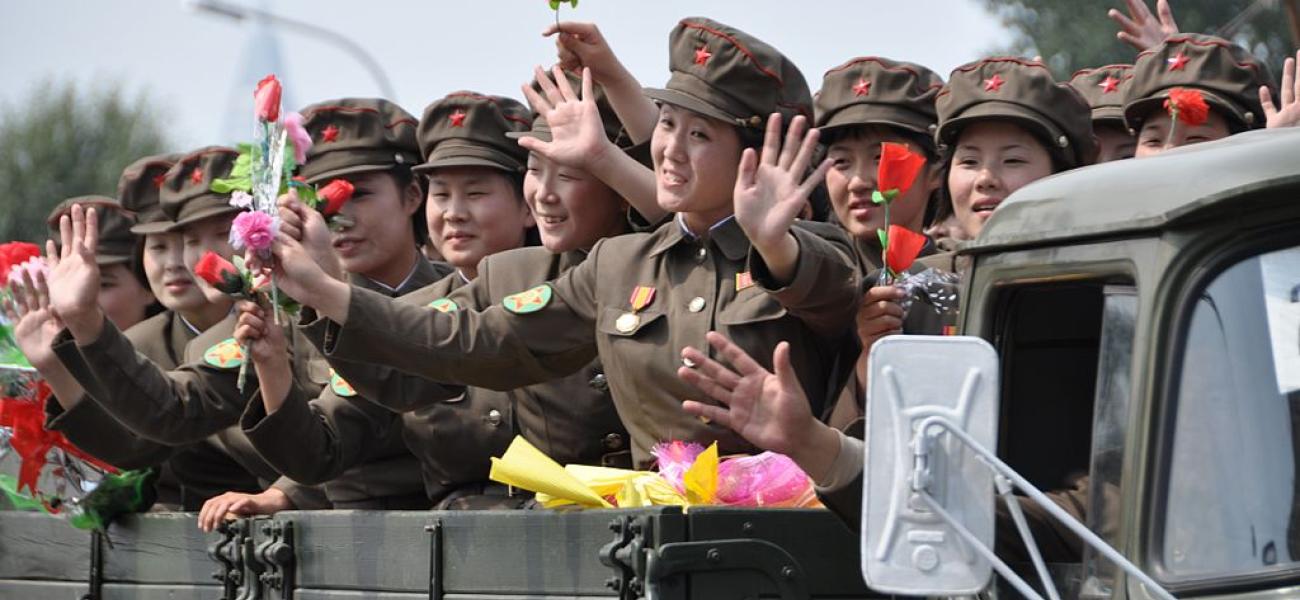In the Thick of It
A blog on the U.S.-Russia relationship
Can Russia Help the US on North Korea, or ‘The Problem With Deterrence? You Only Know When It Fails’
In their efforts to resolve the North Korean nuclear standoff U.S. policymakers should leverage Moscow’s long history of relatively close ties with Pyongyang and give more consideration to the role Russia could play as a mediator: This was the consensus among an international panel of scholars, including two Russians and three Americans, at a talk hosted last month by the Foreign Policy Research Institute and the Wilson Center in Washington, D.C. The event coincided with FPRI’s publication of a report, “Nuclear Weapons and Russian-North Korean Relations,” featuring the scholars’ work and claiming to be the most in-depth recent examination of the Kremlin’s relationship with its reclusive Far East neighbor.
The conference proved timely, coming just one day after North Korea launched its new Hwasong-15 intercontinental ballistic missile, which some analysts say could threaten the U.S. mainland. All the panelists emphasized the importance of negotiations with the North Korean regime, as the alternative could very well be nuclear war, which would be devastating for all involved. While Pyongyang and Washington may not want an active conflict on the Korean peninsula, the countries face a “binary choice” between war and negotiations, according to Georgy Toloraya, a professor at Moscow State Institute of International Relations.
While Russia has its own interests surrounding North Korea, including stability, denuclearization and limited Western influence on the peninsula—the first two coincide with U.S. interests, while the last does not. Still, Moscow has enough common interests with all the relevant parties to authoritatively communicate with them, according to the panelists. Moreover, Russia has deep historic and diplomatic connections to North Korea. “Since the late 19th century, Russia has been a major stakeholder in Korean affairs,” according to Artyom Lukin, a professor of international relations at the Far Eastern Federal University in Vladivostok. The speakers also pointed out that the Democratic People's Republic of Korea (DPRK), as it is officially known, was practically built by the Soviet Union. This shared history has created trust between the two countries, the panelists noted, and Russia can be seen as an “honest broker” between sides with wildly divergent interests—serving a role similar to the one it had during negotiations over Iran’s nuclear program.
While China today has the strongest economic ties of any country with North Korea, policymakers in the U.S. need to look beyond their “obsession” with Beijing as the only other relevant stakeholder in negotiations in the view of Rensselaer W. Lee III, a senior fellow at FPRI. China is often perceived as too supportive of the North Korean regime, and the DPRK is skeptical of Western promises. As many of the speakers said, Kim Jong-un is primarily interested in regime survival, and he has greater faith in Russia than in the U.S. to ensure that.
Tolaraya, who had just returned from North Korea, strongly criticized the current U.S. strategy to contain the conflict, saying, “You cannot expect North Korea to stop its course just because of sanctions.” He said that the sanctions continue to affect ordinary North Koreans, but that elites always find ways around them. Tolaraya also described the rhetoric from the Trump administration as unhelpful, and he urged U.S. leaders to examine North Korea’s interests in creating a nuclear program and to devise effective negotiation strategies that will address the concerns of all parties.
Somewhat surprisingly the speakers disagreed on one key issue: North Korea’s nuclear capabilities. William Severe, a former physicist who held positions at the International Atomic Energy Agency and the State Department, claimed that many experts are overreacting about the North Korean nuclear threat, which he insisted was minimal. Sue Mi Terry, a senior advisor for North Korea at the Bower Group Asia consultancy and a former U.S. intelligence officer, strongly disagreed, arguing that the U.S. has “consistently underestimated” advances in North Korean nuclear technology.
The panelists agreed that U.S. cooperation with Russia would be difficult, given the growing tensions in the bilateral relationship and President Donald Trump’s aversion to multilateral negotiations. While some of them expressed hope that Russia’s involvement could offer avenues for U.S.-Russia cooperation in a relationship increasingly devoid of them, it is clear that, as special counsel Robert Mueller’s investigation intensifies, Trump will likely face more domestic pressure to distance himself from Russia. Any attempts to bring Moscow into the negotiation process with North Korea would be met with considerable skepticism by the U.S. foreign policy establishment. Many panelists also noted that the Trump administration has shown a clear preference for bilateral negotiations, excluding third parties from the table. But the urgency of the problem was apparent to the entire panel. A stalemate may prevail for the time being between the U.S. and North Korea, with both sides deterred from attacking. But, as Chris Miller of the Fletcher School of Law and Diplomacy pointed out, the problem with measuring the effectiveness of deterrence, from a political science perspective, is that “you only know when it fails.”
Photo by Uri Tours, shared under a CC-BY-SA-2.0 license.
The opinions expressed in this blog post are solely those of the author.

